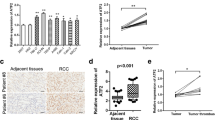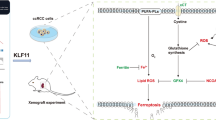Abstract
Background
Chicken ovalbumin upstream promoter-transcription factor II (COUP-TFII) may be an oncogenic gene in renal cell carcinoma (RCC). However, the direct association between COUP-TFII expression and patient survival has not been investigated in patients with RCC, and the molecular oncogenesis of COUP-TFII in RCC remains unclear.
Methods
The mRNA expression levels of COUP-TFII in the tumors of 283 patients with RCC were determined by RT-qPCR. The remaining 266 patients were categorized into low- and high-expression groups according to the cut off value generated by receiver operating curve (ROC) analysis. The function of COUP-TFII in RCC cells was tested by knockdown experiments in vitro.
Results
In the present study, it was revealed that the mRNA expression levels of COUP-TFII were significantly higher in tumors compared with those in adjacent non-cancerous tissues, and that the overexpression of COUP-TFII was strongly associated with poor patient survival. It was further demonstrated that knockdown of COUP-TFII suppressed proliferation, and induced apoptosis and cell cycle arrest in RCC cells in vitro. This also resulted in the activation of the mitochondria-mediated apoptosis pathway, impaired migration and invasion of RCC cells through epithelial–mesenchymal transition in vitro, and suppressed tumor growth in vivo. In addition, it was revealed that the induction of cell migration and invasion by COUP-TFII was mediated, at least in part, by integrin subunit β1.
Conclusions
In summary, the present study indicated that COUP-TFII is an oncogenic gene in RCC, and a potential therapeutic target for the treatment of the disease.





Similar content being viewed by others
References
Qin J, Chen X, Xie X, Tsai MJ, Tsai SY. COUP-TFII regulates tumor growth and metastasis by modulating tumor angiogenesis. Proc Natl Acad Sci U S A. 2010;107(8):3687–92.
Zhang C, Han Y, Huang H, Qu L, Shou C. High NR2F2 transcript level is associated with increased survival and its expression inhibits TGF-β-dependent epithelial–mesenchymal transition in breast cancer. Breast Cancer Res Treat. 2014;147(2):265–81.
Qin J, Chen X, Yu-Lee LY, Tsai MJ, Tsai SY. Nuclear receptor COUP-TFII controls pancreatic islet tumor angiogenesis by regulating vascular endothelial growth factor/vascular endothelial growth factor receptor-2 signaling. Cancer Res. 2010;70(21):8812–21.
Métivier R, Gay FA, Hübner MR, Flouriot G, Salbert G, Gannon F, Kah O, Pakdel F. Formation of an hER alpha-COUP-TFI complex enhances hER alpha AF-1 through Ser118 phosphorylation by MAPK. EMBO J. 2002;21(13):3443–53.
Le Dily F, Métivier R, Guéguen MM, Le Péron C, Flouriot G, Tas P, Pakdel F. COUP-TFI modulates estrogen signaling and influences proliferation, survival and migration of breast cancer cells. Breast Cancer Res Treat. 2008;110(1):69–83.
Klinge CM, Silver BF, Driscoll MD, Sathya G, Bambara RA, Hilf R. Chicken ovalbumin upstream promoter-transcription factor interacts with estrogen receptor, binds to estrogen response elements and half-sites, and inhibits estrogen-induced gene expression. J Biol Chem. 1997;272(50):31465–74.
Riggs KA, Wickramasinghe NS, Cochrum RK, Watts MB, Klinge CM. Decreased chicken ovalbumin upstream promoter transcription factor II expression in tamoxifen-resistant breast cancer cells. Cancer Res. 2006;66(20):10188–98.
Fan M, Yan PS, Hartman-Frey C, Chen L, Paik H, Oyer SL, Salisbury JD, Cheng AS, Li L, Abbosh PH, Huang TH, Nephew KP. Diverse gene expression and DNA methylation profiles correlate with differential adaptation of breast cancer cells to the antiestrogens tamoxifen and fulvestrant. Cancer Res. 2006;66(24):11954–66.
Al-Rayyan N, Litchfield LM, Ivanova MM, Radde BN, Cheng A, Elbedewy A, Klinge CM. 5-Aza-2-deoxycytidine and trichostatin A increase COUP-TFII expression in antiestrogen-resistant breast cancer cell lines. Cancer Lett. 2014;347(1):139–50.
Muscat GE, Eriksson NA, Byth K, Loi S, Graham D, Jindal S, Davis MJ, Clyne C, Funder JW, Simpson ER, Ragan MA, Kuczek E, Fuller PJ, Tilley WD, Leedman PJ, Clarke CL. Research resource: nuclear receptors as transcriptome: discriminant and prognostic value in breast cancer. Mol Endocrinol. 2013;27(2):350–65.
Zhang C, Han Y, Huang H, Qu L, Shou C. High NR2F2 transcript level is associated with increased survival and its expression inhibits TGF-β-dependent epithelial–mesenchymal transition in breast cancer. Breast Cancer Res Treat. 2014;147(2):265–81.
Zheng J, Qin W, Jiao D, Ren J, Wei M, Shi S, Xi W, Wang H, Yang AG, Huan Y, Wen W. Knockdown of COUP-TFII inhibits cell proliferation and induces apoptosis through upregulating BRCA1 in renal cell carcinoma cells. Int J Cancer. 2016;139(7):1574–85.
Livak KJ, Schmittgen TD. Analysis of relative gene expression data using real-time quantitative PCR and the 2(-Delta Delta C(T)) Method. Methods. 2001;25(4):402–8.
Yang YX, Wei L, Zhang YJ, Hayano T, Piñeiro Pereda MDP, Nakaoka H, Li Q, Barragán Mallofret I, Lu YZ, Tamagnone L, Inoue I, Li X, Luo JY, Zheng K, You H. Long non-coding RNA p10247, high expressed in breast cancer (lncRNA-BCHE), is correlated with metastasis. Clin Exp Metastasis. 2018;35(3):109–21.
Bao Y, Gu D, Feng W, Sun X, Wang X, Zhang X, Shi Q, Cui G, Yu H, Tang C, Deng A. COUP-TFII regulates metastasis of colorectal adenocarcinoma cells by modulating Snail1. Br J Cancer. 2014;111(5):933–43.
Gurevich F, Perazella MA. Renal effects of anti-angiogenesis therapy: update for the internist. Am J Med. 2009;122(4):322–8.
Polvani S, Tarocchi M, Tempesti S, Mello T, Ceni E, Buccoliero F, D’Amico M, Boddi V, Farsi M, Nesi S, Nesi G, Milani S, Galli A. COUP-TFII in pancreatic adenocarcinoma: clinical implication for patient survival and tumorprogression. Int J Cancer. 2014;134(7):1648–58.
Qin J, Wu SP, Creighton CJ, Dai F, Xie X, Cheng CM, Frolov A, Ayala G, Lin X, Feng XH, Ittmann MM, Tsai SJ, Tsai MJ, Tsai SY. COUP-TFII inhibits TGF-β-induced growth barrier to promote prostate tumorigenesis. Nature. 2013;493(7431):236–40.
Lin SC, Kao CY, Lee HJ, Creighton CJ, Ittmann MM, Tsai SJ, Tsai SY, Tsai MJ. Dysregulation of miRNAs-COUP-TFII-FOXM1-CENPF axis contributes to the metastasis of prostate cancer. Nat Commun. 2016;7:11418.
Ding W, Zhang Y, Cai H, Liu G, Ye Y, Xu G, Wang H, Xiong D, Zhang C, Huang Z, Luo Q. Overexpression of COUP–TFII suppresses proliferation and metastasis of human gastric cancer cells. Mol Med Rep. 2018;17(2):2393–401.
Hawkins SM, Loomans HA, Wan YW, Ghosh-Choudhury T, Coffey D, Xiao W, Liu Z, Sangi-Haghpeykar H, Anderson ML. Expression and functional pathway analysis of nuclear receptor NR2F2 in ovarian cancer. J Clin Endocrinol Metab. 2013;98(7):E1152–62.
Author information
Authors and Affiliations
Contributions
YW and FA conceived and designed this study. XF, CXL, XRZ, XMH and WLC performed the research, XF wrote the manuscript. All authors read and approved the final manuscript.
Corresponding authors
Ethics declarations
Conflict of interest
The authors have declared that no conflicts of interest exist.
Research involving human participants and/or animals
All procedures performed in studies involving human participants were in accordance with the ethical standards of the institutional and/or national research committee and with the 1964 Helsinki Declaration and its later amendments or comparable ethical standards. The ethical committee of The Central Hospital of Wuhan granted permission to perform the study on human subjects.
Informed consent
All participants provided informed consent prior to their participation.
Additional information
Publisher's Note
Springer Nature remains neutral with regard to jurisdictional claims in published maps and institutional affiliations.
Rights and permissions
About this article
Cite this article
Fang, X., Liu, CX., Zeng, XR. et al. Orphan nuclear receptor COUP-TFII is an oncogenic gene in renal cell carcinoma. Clin Transl Oncol 22, 772–781 (2020). https://doi.org/10.1007/s12094-019-02190-z
Received:
Accepted:
Published:
Issue Date:
DOI: https://doi.org/10.1007/s12094-019-02190-z




